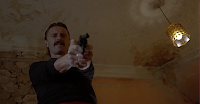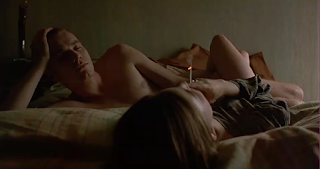How does the aesthetic quality of Trainspotting depict ideological issues of youth and addiction?
How does the aesthetic quality of Trainspotting depict ideological issues of youth and addiction?
Part one: Renton Chooses heroin (01:45-5:50)
 The sequence begins with a close up pan of Renton lying on the ground, high. Non-diegetic narration explains to the audience that he "chose not to choose life". "who needs reasons when you have heroin" he says, as the camera pans backwards away from him, Iggy Pops Lust For Life plays, also non-diegetic, in the background of the narration. Choose Life was a protest movement in the 1980s, made famous by WHAM! and is a message of many different things. The way Renton interprets this is that you can choose the mundanity of life, or live for something else, and this is reflected through the heroin. The message was also fought against by different generations. Renton's generation of youth chooses to rebel against "life" and social norms, and the most obvious way to do this is to take drugs, as they change how life looks and feels. This is seen later on where Renton explains the "pleasure of it, otherwise we wouldn't do it!" As the camera pans past a baby and Sick Boy and his girlfriend doing heroin, we can see the colour palette of Mother Superiors apartment: greens, reds, purples and yellows all join together to create a hyperrealistic environment.
The sequence begins with a close up pan of Renton lying on the ground, high. Non-diegetic narration explains to the audience that he "chose not to choose life". "who needs reasons when you have heroin" he says, as the camera pans backwards away from him, Iggy Pops Lust For Life plays, also non-diegetic, in the background of the narration. Choose Life was a protest movement in the 1980s, made famous by WHAM! and is a message of many different things. The way Renton interprets this is that you can choose the mundanity of life, or live for something else, and this is reflected through the heroin. The message was also fought against by different generations. Renton's generation of youth chooses to rebel against "life" and social norms, and the most obvious way to do this is to take drugs, as they change how life looks and feels. This is seen later on where Renton explains the "pleasure of it, otherwise we wouldn't do it!" As the camera pans past a baby and Sick Boy and his girlfriend doing heroin, we can see the colour palette of Mother Superiors apartment: greens, reds, purples and yellows all join together to create a hyperrealistic environment.
The colours and hyperrealism create an unreliable view of the world, almost like the audience are experiencing Heroin as Renton is, as the world dramatically changes whenever he takes it. Reality is confusing and discomforting in Trainspotting, and is hard to differentiate from the fictional world. The reds and greens juxtapose one another, similarly to the two worlds. The nihilistic view of the 90s was shared by many, and people like Renton were trying to escape it. This could also represent views of Scotland as a country: a place that is decrepit and dirty. We now see the opposite of Renton and his friends, Begbie and Tommy.  They represent the people who "chose life" and abstain from drugs. However, Begbie is an obvious lover of beer! And could be argued that his addiction is what makes him a psychopath, and there is a point that suggests no addiction is worse than the other, Tommy also smokes and Renton mentions later that his mother has a legal addiction. And so what defines what is a healthy addiction and what isn't? Again the mise-en-scene of the colour palette suggests that we are in the real world, browns and beiges of dull life fill the screen. A jump cut back to the "present" creates confusion and makes the audience question if we are in Renton's mind or viewing separate events. F
They represent the people who "chose life" and abstain from drugs. However, Begbie is an obvious lover of beer! And could be argued that his addiction is what makes him a psychopath, and there is a point that suggests no addiction is worse than the other, Tommy also smokes and Renton mentions later that his mother has a legal addiction. And so what defines what is a healthy addiction and what isn't? Again the mise-en-scene of the colour palette suggests that we are in the real world, browns and beiges of dull life fill the screen. A jump cut back to the "present" creates confusion and makes the audience question if we are in Renton's mind or viewing separate events. F inally, Renton states he wants to get "of the skag" but contrapuntally he states "of course I'd have another shot, after all I had work to do" This shows Renton's refusal to "choose life" after all. and the red glow of the light suggests this.
inally, Renton states he wants to get "of the skag" but contrapuntally he states "of course I'd have another shot, after all I had work to do" This shows Renton's refusal to "choose life" after all. and the red glow of the light suggests this.
 They represent the people who "chose life" and abstain from drugs. However, Begbie is an obvious lover of beer! And could be argued that his addiction is what makes him a psychopath, and there is a point that suggests no addiction is worse than the other, Tommy also smokes and Renton mentions later that his mother has a legal addiction. And so what defines what is a healthy addiction and what isn't? Again the mise-en-scene of the colour palette suggests that we are in the real world, browns and beiges of dull life fill the screen. A jump cut back to the "present" creates confusion and makes the audience question if we are in Renton's mind or viewing separate events. F
They represent the people who "chose life" and abstain from drugs. However, Begbie is an obvious lover of beer! And could be argued that his addiction is what makes him a psychopath, and there is a point that suggests no addiction is worse than the other, Tommy also smokes and Renton mentions later that his mother has a legal addiction. And so what defines what is a healthy addiction and what isn't? Again the mise-en-scene of the colour palette suggests that we are in the real world, browns and beiges of dull life fill the screen. A jump cut back to the "present" creates confusion and makes the audience question if we are in Renton's mind or viewing separate events. F inally, Renton states he wants to get "of the skag" but contrapuntally he states "of course I'd have another shot, after all I had work to do" This shows Renton's refusal to "choose life" after all. and the red glow of the light suggests this.
inally, Renton states he wants to get "of the skag" but contrapuntally he states "of course I'd have another shot, after all I had work to do" This shows Renton's refusal to "choose life" after all. and the red glow of the light suggests this.Part two: Renton goes to London (54:45 - 1:01:20)
Renton is now clean of heroin, and has tested HIV negative. As mentioned earlier, there are two styles in Trainspotting: naturalism and hyperrealism. Now he is clean, his world is also clean, with no sharp contrasts or colours, it fades into one another, and this could be seen as a metaphor for the society he has now joined, boring and undisdiguishable from one another. He is still an outsider looking in, but is no longer looking in from the outside. The lighting here also highlights Renton inside these groups of people doing the same thing, something he has actively tried to get away from.
"surrounded by the living dead. But no, not me, I'm negative. (…) depression, boredom, you'll feel so fucking low you'll want to fucking top yourself " Choosing life for many is what he think is depressing and boring, his life is one of excitement and adventure. Trainspotting is a social-realist film, but has none of the conventions of one, and there could be a message inside the films aesthetic that the lives shown in those social-realist films are, frankly, boring.
AIDS was an epidemic in the 80s and 90s. Tommy is HIV positive, and as seen above is being treated like some kind of zombie, and the image on the right even makes him appear like one, he literally is "the living dead". He is only 23/24 when he dies and arguably Renton is the one who kills him, this makes the audience question the decisions made by youth and also what addiction can do to a person. As Renton hands Tommy the money to buy more heroin, we can see a resemblance to Michelangelo's Creation of Man, Renton is effectively killing Tommy, and is therefore ironic.
do to a person. As Renton hands Tommy the money to buy more heroin, we can see a resemblance to Michelangelo's Creation of Man, Renton is effectively killing Tommy, and is therefore ironic.
 do to a person. As Renton hands Tommy the money to buy more heroin, we can see a resemblance to Michelangelo's Creation of Man, Renton is effectively killing Tommy, and is therefore ironic.
do to a person. As Renton hands Tommy the money to buy more heroin, we can see a resemblance to Michelangelo's Creation of Man, Renton is effectively killing Tommy, and is therefore ironic.
"You're not getting any younger Mark, the worlds changing, music's changing even drugs are changing, you cant sit here all day doing a bit of heroin and Ziggy Pop" Diane is also the new generation, and her mispronunciation of Iggy Pop shows just how quickly times change, and how Mark cannot continue to live like this anymore, he must grow as a person, and this ironically comes from a fourteen year-old girl. "The point is you've got to find something new."
As dance music plays non-diegetically, the style of filming changes once again, it is now much similar to documentary style and more social-realistic. The montage of London's monuments and this new dance music shows the audience the change Marks life has had, and how he was "almost content" Mark is now a letting agent, and he doesn't miss his old life at all, "I quite enjoyed the sound of it all", "there was no such thing as society" Mark has accepted now that he has to choose life, he has to play along to the humdrum tune of routine, however, he is aware that it is all a façade t o make people feel better about doing nothing with their lives, and in that way shows us how aware he is, and how aware some people of the time were. However, his old life constantly tries to creep back into his new one, and this is shown through Begbie. He can't escape addiction and his youth, because youth is the start of your life, and is the most important time of it too.
o make people feel better about doing nothing with their lives, and in that way shows us how aware he is, and how aware some people of the time were. However, his old life constantly tries to creep back into his new one, and this is shown through Begbie. He can't escape addiction and his youth, because youth is the start of your life, and is the most important time of it too.
 o make people feel better about doing nothing with their lives, and in that way shows us how aware he is, and how aware some people of the time were. However, his old life constantly tries to creep back into his new one, and this is shown through Begbie. He can't escape addiction and his youth, because youth is the start of your life, and is the most important time of it too.
o make people feel better about doing nothing with their lives, and in that way shows us how aware he is, and how aware some people of the time were. However, his old life constantly tries to creep back into his new one, and this is shown through Begbie. He can't escape addiction and his youth, because youth is the start of your life, and is the most important time of it too. 






Comments
Post a Comment